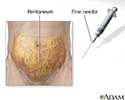Peritonitis - spontaneous bacterial
Spontaneous bacterial peritonitis (SBP); Ascites - peritonitis; Cirrhosis - peritonitis
The peritoneum is the thin tissue that lines the inner wall of the abdomen and covers most of the organs in the abdomen. Peritonitis is present when this tissue becomes inflamed or infected.
Spontaneous bacterial peritonitis (SBP) is present when this tissue becomes infected and there is no clear cause.
Causes
SBP is most often caused by infection in fluid that collects in the peritoneal cavity (ascites). The fluid buildup often occurs with advanced liver or kidney disease.
Risk factors for liver disease include:
- Very heavy alcohol use
- Chronic hepatitis B or hepatitis C
- Other diseases that lead to cirrhosis
SBP also occurs in people who are on peritoneal dialysis for kidney failure.
Peritonitis may have other causes. These include infection from other organs or leakage of enzymes or other toxins into the abdomen.
Symptoms
Symptoms include:
- Abdominal pain and bloating
- Abdominal tenderness
- Fever
- Low urine output
Other symptoms include:
Exams and Tests
Tests will be done to check for infection and other causes of abdominal pain:
- Blood culture
- White blood cell count in a sample of peritoneal fluid
- Chemical examination of peritoneal fluid
- Culture of peritoneal fluid
- CT scan or ultrasound of the abdomen
Treatment
Treatment depends on the cause of the SBP.
- Surgery may be needed if SBP is caused by a foreign object, such as a catheter used in peritoneal dialysis.
- Antibiotics to control infection.
- Fluids given through the veins.
You will need to stay in the hospital so health care providers can rule out other causes such as a ruptured appendix and diverticulitis.
Outlook (Prognosis)
In most cases, the infection can be treated. However, kidney or liver disease may limit recovery.
Possible Complications
Complications may include:
- Loss of brain function occurs when the liver is unable to remove toxins from the blood.
- Kidney problem caused by liver failure.
- Sepsis.
When to Contact a Medical Professional
Contact your provider if you have symptoms of peritonitis. This can be a medical emergency situation.
Prevention
Steps should be taken to prevent infection in people with peritoneal catheters.
Continuous antibiotics may be used:
- To prevent peritonitis from coming back in people with liver failure
- To prevent peritonitis in people who have acute gastrointestinal bleeding due to other conditions
References
Garcia-Tsao G. Cirrhosis and its sequelae. In: Goldman L, Schafer AI, eds. Goldman-Cecil Medicine. 26th ed. Philadelphia, PA: Elsevier; 2020:chap 144.
Kuemmerle JF. Inflammatory and anatomic diseases of the intestine, peritoneum, mesentery, and omentum. In: Goldman L, Schafer AI, eds. Goldman-Cecil Medicine. 26th ed. Philadelphia, PA: Elsevier; 2020:chap 133.
Sola E, Gines P. Ascites and spontaneous bacterial peritonitis. In: Feldman M, Friedman LS, Brandt LJ, eds. Sleisenger and Fordtran's Gastrointestinal and Liver Disease. 11th ed. Philadelphia, PA: Elsevier; 2021:chap 93.
Review Date: 5/6/2022
Reviewed By: Michael M. Phillips, MD, Emeritus Professor of Medicine, The George Washington University School of Medicine, Washington, DC. Also reviewed by David C. Dugdale, MD, Medical Director, Brenda Conaway, Editorial Director, and the A.D.A.M. Editorial team.
















